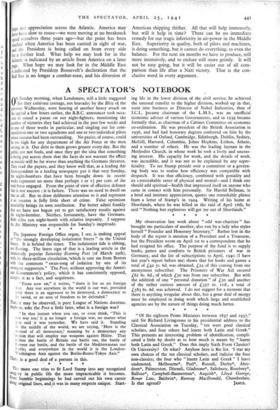The more one tries to fit Lord Stamp into any
recognised ratgory in public life the more impracticable it becomes. From humble beginnings he had carved out his own career '1(418 original lines, andit was in many respects unique. Start- ing life in the lower division of the civil service, he achieved the unusual transfer to the higher division, worked up in that, went into business as Director of Nobel Industries, then of I.C.I., jpecame chairman of the was an unofficial economic adviser of various Governments, and in 1939 became formally that, as chairman of a Cabinet Committee on economic co-ordination. He was president of the British Association in 1936, and had had honorary degrees conferred on him by the universities of Oxford, Cambridge, Edinburgh, Dublin, Sydney, McGill, Harvard, Columbia, Johns Hopkins, Lisbon, Athens, and a number of others. He was the leading layman in the Methodist Church, in whose work he took a lively and unceas- ing interest. His capacity for work, and the details of work, was incredible, and it was not to be explained by any super- ficiality. To see Stamp preside over a committee or a govern- ing body was to realise how efficiency was compatible with despatch. It was that efficiency, combined with geniality and an Lnmistakable sense of physical and mental—and I think one should add spiritual—health that impressed itself on anyone who came in contact with him personally. Sir Harold Bellman, ;11. a brief and intimate appreciation, quotes one remarkable phrase from a letter of Stamp's in 1924. Writing of his home at Shortlands, where he was killed in the raid of April 16th, he said "Nothing but explosives will get me out of Shordnds."


























 Previous page
Previous page